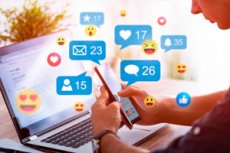New publications
Study: sleep, social media and teen brain activity are linked
Last reviewed: 02.07.2025

All iLive content is medically reviewed or fact checked to ensure as much factual accuracy as possible.
We have strict sourcing guidelines and only link to reputable media sites, academic research institutions and, whenever possible, medically peer reviewed studies. Note that the numbers in parentheses ([1], [2], etc.) are clickable links to these studies.
If you feel that any of our content is inaccurate, out-of-date, or otherwise questionable, please select it and press Ctrl + Enter.

A new study to be presented at the SLEEP 2024 annual meeting has found clear links between sleep duration, social media use, and brain activation in areas key to executive control and reward processing.
The results show a correlation between shorter sleep duration and greater social media use among adolescents. The analysis points to the involvement of regions within the frontolimbic regions of the brain, such as the inferior and middle frontal gyrus, in these relationships. The inferior frontal gyrus, key for controlling inhibition, may play a critical role in how adolescents regulate their interactions with rewarding stimuli such as social media. The middle frontal gyrus, involved in executive functions and critical for evaluating and responding to rewards, is necessary for guiding decisions related to balancing immediate rewards from social media with other priorities such as sleep. These results suggest a complex interplay between specific brain regions during adolescence and their impact on behavior and sleep in the context of digital media use.
“As these young brains undergo significant changes, our findings suggest that poor sleep and high social media engagement could potentially alter sensitivity to neural rewards,” said Orsolya Kiss, PhD, a cognitive psychologist and research fellow at SRI International in Menlo Park, Calif. “This complex interaction shows that both digital engagement and sleep quality significantly influence brain activity, with clear implications for adolescent brain development.”
The study used data from 6,516 adolescents aged 10 to 14 years from the Adolescent Brain Study. Sleep duration was assessed using the Munich Chronotype Questionnaire, and social media use for entertainment was assessed using the Teen Screen Time Survey. Brain activity was analyzed using functional MRI scans during a monetary delay task targeting areas associated with reward processing. The study used three different sets of models, and the predictors and outcomes varied each time. Results were adjusted for age, timing of the COVID-19 pandemic, and sociodemographic characteristics.
Kiss noted that these findings provide new evidence about how two significant aspects of modern teen life — social media use and sleep duration — interact to influence brain development.
“Understanding the specific brain regions involved in these interactions helps us identify potential risks and benefits associated with digital engagement and sleep habits. This knowledge is especially important as it can guide the development of more precise, evidence-based interventions aimed at promoting healthier habits.” - Orsolya Kiss, Research Scientist, SRI International
The American Academy of Sleep Medicine recommends that teens ages 13 to 18 get eight to 10 hours of sleep regularly. The AASM also encourages teens to disconnect from all electronic devices at least 30 minutes to an hour before bed.
The results of the study were published in the journal Sleep.
